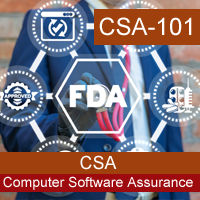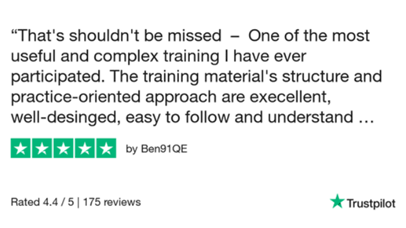CSA: Computer Software Assurance
 |
Price: $ |
Document your dedication to quality, compliance, safety, and job performance by earning a certification of training.Training Program: CSA: Computer Software AssuranceTraining Provided By: Biopharma Institute Website: https://www.biopharmainstitute.com Schedule: Self-paced. Immediate access to training materials upon enrollment. Description:  The FDA's approach to Computer System Assurance (CSA) represents a modernized perspective on computer system validation (CSV), aiming to ensure that systems used in the pharmaceutical, medical device, food, cosmetic, and dietary supplement regulated industries are reliable, consistent, and meet quality standards without imposing unnecessary burdens on the industry. This approach is in alignment with the principles of risk management and quality systems management, focusing on critical thinking and the assurance of patient safety, product quality, and data integrity. Key aspects of the CSA approach include: Risk-Based Approach: CSA emphasizes a risk-based approach to computer system validation, prioritizing efforts on systems and processes that have a direct impact on patient safety, product quality, and data integrity. This contrasts with traditional CSV, which often applied the same level of rigor to all systems regardless of their impact. Critical Thinking: Encouraging the use of critical thinking skills to assess risks and determine the most effective and efficient ways to ensure system reliability and compliance. This moves away from a prescriptive, checklist-based approach towards a more thoughtful analysis of what is necessary to assure system performance. Efficiency and Flexibility: CSA aims to reduce unnecessary documentation and testing for low-risk systems, thereby increasing efficiency. This flexible approach allows companies to focus resources on areas that matter most for patient safety and product quality. Leveraging Existing Best Practices and Standards: CSA encourages the integration of existing quality management systems and industry standards, reducing the need for bespoke validation processes and documentation. Continuous Improvement: Emphasizing the importance of continuous monitoring and improvement of computerized systems throughout their lifecycle, aligning with quality management principles. Aligning with Global Standards: The CSA approach is designed to be compatible with international standards and regulatory expectations, facilitating global harmonization in the life sciences sector. The FDA's shift towards CSA is part of a broader movement to modernize regulation and oversight, making it more adaptable to rapid technological advancements and the increasing use of digital systems in healthcare and life sciences. By focusing on what is truly important for ensuring the safety and effectiveness of products, the CSA approach aims to streamline validation efforts, reduce compliance costs, and promote innovation without compromising on quality or patient safety. Certification Requirements: Students must view the entire course and successfully pass an online, multiple-choice final assessment within a 12-month period. A certificate of completion is immediately accessible in PDF format after satisfying the requirements. Biopharma Institute's online training courses include immediate access after enrollment. Username, password, and instructions are emailed to the student directly following online enrollment into the program. Course takers may attempt the final assessment any number of times, as needed, to achieve a passing score. The certificate of completion is promptly launched and made available to the student upon course completion. Certificates are issued in an encrypted PDF format, and include a watermark, unique validation code, and QR verification barcode. Once all training requirements have been satisfied the achievement can be verified from our website using the unique certificate ID or QR barcode located on the certificate. For professional certification programs, a digital badge is additionally issued to verify training and document the achievement. Digital badges can be displayed on social networking sites, such as LinkedIn, Facebook, Twitter, and Badgr. Biopharma Institute certificates and digital badges include the date of completion, but do not have an expiration date. However, compliance training is typically considered valid for a period of 3 years. Many organizations suggest that compliance training should be refreshed at least every three years to stay up to date with regulations, standards, guidelines, and to reinforce the importance of maintaining compliance. The validity period for employee compliance training would be determined by those responsible for managing quality assurance. |
Outline:INTRODUCTION FDA 21 CFR PART 11 Electronic Records Electronic Signatures Security Controls & Record Retention ISPE's GAMP®5 GAMP®5 Software Categories What is CSA? CSA vs. CSV A Paradigm Shift: CSV to CSA Origin of CSA CSA Key Aspects The CSA Approach Assessment Questions VERIFICATION, VALIDATION, AND QUALIFICATION TERMINOLOGIES AND REQUIREMENTS FOR TESTING Software Quality Assurance (SQA) Consistency, Complexity, and Change Verification, Validation, and Qualification Requirements for Testing ROLE OF SUPPLIERS IN BUILDING A ROBUST SYSTEM Importance of Supplier in CSA Leveraging Supplier Documentation Key Areas Related to Supplier Testing Assessment Questions UTILIZATION OF CRITICAL THINKING AND RISK BASED APPROACH IN SYSTEM LIFE CYCLE Critical Thinking to Identify Level of Testing Types of Testing Unscripted Testing Scripted Testing System Categorization Based on Intended Use GxP Criticality of Different Functions of the System Case Study One Case Study Two Assessment Questions USE OF MODERN TECHNOLOGIES AND TOOLS FOR COMPLIANCE Agile Methodology Cloud Computing Assessment Questions HISTORIC FIGURES Historical Approaches for Defining Software Quality McCall's Quality Model Assessment Questions SUMMARY | Objectives:To uderstand what is Computer Software Assurance (CSA) Be able to describe the difference of CSA and Computer System Validation Describe the Key Aspects of CSA Lear the fundamentals of Software Quality Assurance (SQA) Understand the meaning of consistency, complexity & change Understand the differences between verification, validation, and qualification Describe the requirements for testing Understand system categorization based on intended use Learn the GxP Criticality of different functions of the system Describe how to leverage supplier documentation Understand the Types of Testing available | |
Use our Search Form to Find What You're Looking For:
Benefits of Training with Biopharma Institute
| Immediate access to courses: | Username, password, instructions, and receipt of payment are immediately emailed upon online enrollment. |
| Self-paced, asynchronous eLearning: | 24/7 access to all course materials and assessments for 12 months. |
| Open enrollment: | No prior course prerequisites or work experience required. |
| Expertise: | Courses developed by subject matter experts (SMEs) in the area being taught. |
| Current and validated: | Training is current with respect to regulations, procedures, and 3rd party validated and/or accredited. |
| Optimized for learning: | Courses include voiceovers, easy navigation, reading materials, case studies, progress checks, and high-quality animations to increase retention of subject matter. |
| Secure and safe access: | Encrypted website and LMS connections, firewall, and daily malware scans deliver optimal security and performance. |
| Flexible final assessments: | Multiple-choice questions can be taken repeatedly until a passing score is achieved. |
| Direct access to certificates: | Upon completion, certificates are immediately issued in an encrypted PDF format. Certificates include a watermark, unique validation code, and QR verification barcode. |
| Verification of training: | Certificates are verifiable online using QR barcode or the unique ID code. Digital badges are additionally issued for all professional certification programs. |
| Training manager access: | A proprietary portal offers access to download enrollment reports, training records, account balance, and more. |
| SCORM-compliant courses: | Courses can be delivered directly to most corporate Learning Management Systems (LMS). |
| Purchase orders (POs): | POs are accepted from all companies. Request an invoice when starting the procurement process. |
| Reimbursement: | Some employers may reimburse their employees for training expenses. Check your company's policy. |
| Financial assistance: | Payment plans are available to those who qualify. Alternatively, purchasing individual courses one at a time is also an option. |
| Career advancement: | Professional certifications help demonstrate interest and dedication to career and job performance. They may be helpful for those seeking to grow their career or transitioning to a different position within an organization. Professional certifications are a great addition to a resume, offer talking points for the interview, and practical knowledge for performing duties. |
Have Questions? Contact Us:
Use the form below if you would like more information on our programs. You may want to request a quote on group training or an invoice for generating a company purchase order. For quotes or invoices please provide the course(s) and number of students. Alternatively, call toll-free from the US or Canada: +1 (888) 424-6576. International callers may dial: +1 (201) 301-8370.

 Download
Download 




